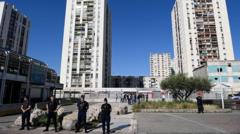The National Assembly of France has voted 98-51 to scrap low-emission zones (ZFEs) originally established to mitigate urban air pollution. Critics argue the zones disproportionately affect lower-income citizens, with lawmakers divided along party lines. While some MPs support abolishing the zones, others warn of the potential health risks from increased air pollution.
France’s National Assembly Votes to Abolish Low-Emission Zones Amid Controversy

France’s National Assembly Votes to Abolish Low-Emission Zones Amid Controversy
In a surprising legislative move, French lawmakers have voted to eliminate low-emission zones, a strategy aimed at combating air pollution, raising concerns about environmental and public health impacts.
France's National Assembly has taken a decisive step towards repealing low-emission zones (ZFEs) with a recent vote of 98-51, igniting heated debates over public health and environmental responsibility. Often hailed as a key initiative during President Emmanuel Macron's administration to reduce air pollution, the ZFEs have been pivotal in curtailing emissions in some of France's largest cities since their introduction in 2019.
The legislation’s repeal was largely driven by opposition parties, including those on the right and far-right, alongside a faction from Macron's own party. Highlighting the contentious nature of the ZFEs, prominent opposition figure Pierre Meurin of the National Rally spearheaded the motion, aligning with various motoring organizations who deemed the zones classist. Alexandre Jardin, a writer and activist, played a crucial role in rallying support for the repeal through his movement Les #Gueux, claiming, "ecology has turned into a sport for the rich," implying that the regulations unfairly burden the less affluent.
The origins of the ZFEs lie in the effort to combat pollution in 15 of France’s most polluted cities, with the program eventually expanding to include urban areas with populations exceeding 150,000. Under the original guidelines, vehicles manufactured before 1997 were banned, while those produced post-1997 were obliged to display a "Crit'Air" sticker for access to these zones.
The backlash against the low-emission zones included strong criticisms from notable figures such as Marine Le Pen and leaders within the right-wing Republicans party, who framed ZFEs as punitive measures against the working class. Despite the government's attempts to moderate the initiative and maintain ZFEs in major cities like Paris and Lyon, these efforts ultimately failed, leading to the vote's outcome.
Agnès Pannier-Runacher, the Minister for Green Transition, defended the ZFEs, citing their contribution to reducing premature deaths linked to air pollution, estimated at nearly 40,000 annually. Proponents of the initiative, including members of the Greens and Socialists, argued that repealing the zones represents a significant setback in public health policy, warning that the vote could obscure ongoing challenges in air pollution reduction.
As the repeal bill heads to France's Senate and later to the lower house for broad approval, potential ramifications for future environmental legislation loom large. The final decision will hinge on not only parliamentary approval but also clearance from France’s Constitutional Council, leaving the future of urban air quality protections uncertain.



















